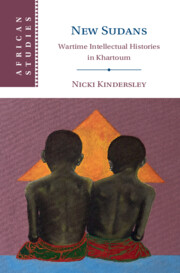Book contents
- New Sudans
- African Studies Series
- New Sudans
- Copyright page
- Dedication
- Contents
- Figures
- Acknowledgements
- Abbreviations
- Maps
- Introduction
- 1 Dar es Salaam
- 2 Building Marginalisation in the Displaced City
- 3 Community Space and Self-Defence
- 4 Alternative Education
- 5 Intellectual Work and Political Thought on the Peripheries
- 6 Akut Kuei and Wartime Mobilisation
- 7 Military Independence and Khartoum’s Warlord Communities
- 8 Return to the South, 2005–2011
- Conclusion
- Bibliography
- Index
- African Studies Series
3 - Community Space and Self-Defence
Published online by Cambridge University Press: 06 February 2025
- New Sudans
- African Studies Series
- New Sudans
- Copyright page
- Dedication
- Contents
- Figures
- Acknowledgements
- Abbreviations
- Maps
- Introduction
- 1 Dar es Salaam
- 2 Building Marginalisation in the Displaced City
- 3 Community Space and Self-Defence
- 4 Alternative Education
- 5 Intellectual Work and Political Thought on the Peripheries
- 6 Akut Kuei and Wartime Mobilisation
- 7 Military Independence and Khartoum’s Warlord Communities
- 8 Return to the South, 2005–2011
- Conclusion
- Bibliography
- Index
- African Studies Series
Summary
To survive the city and the war, displaced families and friends needed to keep themselves and each other physically, socially, mentally, spiritually, and culturally safe. This chapter is about this discussion of self-preservation and what this entailed when, to many, the war and displacement risked societal disaster. It explores the debates and projects that were built within new churchyards, evening schools, and social spaces, where men and women argued over what integrity and moral order looked like. Social and cultural projects – from night language schools and clan associations to childcare circles and neighbourhood vigilante gangs – all involved setting out definitions of responsibility and standards. They also raised questions about the practical meaning of being displaced ‘southerners’. In a stressful expensive city and a fragmenting southern war, this chapter explores how people developed different limits of mutual support and kinship, and understood their political community based on different standards of Blackness, shared history, and knowledge.
- Type
- Chapter
- Information
- New SudansWartime Intellectual Histories in Khartoum, pp. 95 - 141Publisher: Cambridge University PressPrint publication year: 2025

